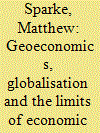| Srl | Item |
| 1 |
ID:
158358


|
|
|
|
|
| Summary/Abstract |
This paper is a response to Antto Vihma’s article ‘Geoeconomic Analysis and the Limits of Critical Geopolitics: A New Engagement with Edward Luttwak’. Taking issue with Vihma’s critique of the limits of critical geopolitics, it argues that it is instead the use of economic strategies in statecraft – Vihma’s state-centric vision of geoeconomics inspired by Edward Luttwak – that is really better understood as limited. To map these limitations, it is necessary to attend to three specific limits: first, the limits of conceptualising geoeconomics in simply instrumental terms as a tool of statecraft; second, the limits of capital and specifically the ways in which the geographical limits created by the on-going tensions between spatial fixity and spatial expansion in capitalism are refracted through the on-going entanglements of geopolitics and geoeconomics; and third, the limits of personal positionality and the emotional fears, hopes, dreams and passions that influence geostrategic discourse more generally. Reflecting on Donald J. Trump’s ascendancy to the US presidency, the paper concludes that it is now more necessary than ever to address how all these force-fields intersect to overdetermine the limits of economic strategy in statecraft.
|
|
|
|
|
|
|
|
|
|
|
|
|
|
|
|
| 2 |
ID:
153726


|
|
|
|
|
| Summary/Abstract |
Theorising situated knowledge formation in relation to geopolitics, geoeconomics and the geosocial, this article adds to the growing literature that evaluates Massive Open Online Courses (MOOCs) by studying who actually participates in them, how, and with what sorts of outcomes. Doing so, this article argues against a geoeconomic view of MOOCs as the revolutionary technology of borderless ‘flat world’ education. Instead, it outlines the far-from-borderless landscape of MOOC participation in terms of geosocial unevenness using evidence from the discussion boards of a global MOOC on globalisation. Based on this empirical evidence, this article suggests that MOOCs can enable forms of connective action through online educational networking, but that these forms of cyborg knowledge formation are possible precisely because they are not ‘borderless, gender-blind, race-blind, class-blind and bank account blind’.
|
|
|
|
|
|
|
|
|
|
|
|
|
|
|
|